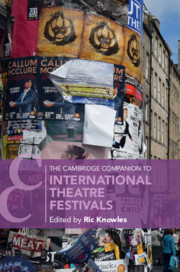Book contents
- The Cambridge Companion to International Theatre Festivals
- Cambridge Companions to Theatre and Performance
- The Cambridge Companion to International Theatre Festivals
- Copyright page
- Dedication
- Contents
- Contributors
- Acknowledgements
- Introduction
- Part I Contexts and Methods
- Part II International Festivals Around the Globe
- Chapter 5 European Festivals
- Chapter 6 International Theatre Festivals in the UK
- Chapter 7 Under the Radar Festival, New York
- Chapter 8 The Australian Festival Network
- Chapter 9 Theatre Festivals in Post-Arab Spring Countries
- Chapter 10 Staging East Africa through Global Exchange
- Chapter 11 The National Arts Festival in Grahamstown
- Chapter 12 Reckoning with Historical Conflicts in East Asian Theatre Festivals
- Chapter 13 Festivals in the Francophone World as Sites of Cultural Struggle
- Chapter 14 International Festivals in Latin America
- Chapter 15 RUTAS | ROUTES
- Appendix List of International Theatre, Performance, and Multi-arts Festivals
- Works Cited
- Further Reading
- Index
Chapter 5 - European Festivals
from Part II - International Festivals Around the Globe
Published online by Cambridge University Press: 22 May 2020
- The Cambridge Companion to International Theatre Festivals
- Cambridge Companions to Theatre and Performance
- The Cambridge Companion to International Theatre Festivals
- Copyright page
- Dedication
- Contents
- Contributors
- Acknowledgements
- Introduction
- Part I Contexts and Methods
- Part II International Festivals Around the Globe
- Chapter 5 European Festivals
- Chapter 6 International Theatre Festivals in the UK
- Chapter 7 Under the Radar Festival, New York
- Chapter 8 The Australian Festival Network
- Chapter 9 Theatre Festivals in Post-Arab Spring Countries
- Chapter 10 Staging East Africa through Global Exchange
- Chapter 11 The National Arts Festival in Grahamstown
- Chapter 12 Reckoning with Historical Conflicts in East Asian Theatre Festivals
- Chapter 13 Festivals in the Francophone World as Sites of Cultural Struggle
- Chapter 14 International Festivals in Latin America
- Chapter 15 RUTAS | ROUTES
- Appendix List of International Theatre, Performance, and Multi-arts Festivals
- Works Cited
- Further Reading
- Index
Summary
This chapter traces the history of European festivals from Richard Wagner’s Bayreuth (with its professed inspiration in the Festival of Dionysus in fifth-century Athens) through the Salzburg Festival, the Festival d’Avignon, the Edinburgh International Festival, and the Festival of Athens and Epidaurus, to the Théâtre des Nations and its successor, Germany’s Theatre der Welt. Examining festival repertoires, it traces an evolution of the representation of difference and the relationship between the international repertoire and the local, settling finally on the 2017 Hamburg edition of Theater der Welt and asking: can an international theatre festival still be a place and a site for community-building and transformation? Examining the supposed ‘global aesthetics’ in evidence in Hamburg’s rigorous deployment of the local, it argues that the political and the aesthetic at festivals necessarily become inextricably entangled.
Keywords
- Type
- Chapter
- Information
- The Cambridge Companion to International Theatre Festivals , pp. 87 - 100Publisher: Cambridge University PressPrint publication year: 2020
- 1
- Cited by

